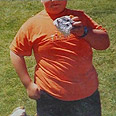
Illustration
Photo: Reuters
Overweight three-year-olds are more likely to remain overweight at older ages. Some 90% of children defined as overweight at the age of three maintained these dimensions at the age of six and 10, an Israeli study showed.
A Clalit Health Services study carried out in Beersheba showed that over a third of Israeli 10-year-olds were overweight or obese.
In a questionnaire given to parents of the children participating in the study, it was found that many parents believe childhood excess weight disappears with time, but the results of the study proved otherwise.
During the seven-year study, the children participating got on weighing scales some 1,200 times. During the study that started in 2002 and continued through 2008, six-year-olds were weighed, and the same children were called back four years later to be weighed at the age of 10.
In addition, information on their weight at the age of three was taken from the children's medical records. The study's results were presented at the 2009 Nutrition convention.
It was found that, on average, over the seven-year period 29% of six-year-olds were overweight, meaning their weight was higher than the 85th percentile weight of their cohorts, with half of them being defined as grossly overweight (over the 95th percentile).
Another weighing at the age of 10 showed that on average 36% of children were overweight, with 18.8% of children defined as grossly overweight. These findings remained constant throughout the entire study.
Eighty-eight percent of the children who were defined as overweight at the age of six stayed that way at the age of 10.
Over 20% of 3-year-olds overweight
In addition to weighing the participants, the children's medical files from the age of three were also inspected, and it was found that over a fifth of the three-year-olds were overweight, with 15% of them grossly overweight.About 90% of the overweight three-year-olds remained overweight at the ages of six and ten.
"The results of the survey from Beersheba put Israel's children in a high and unflattering spot in overweight rates around the world," said Clalit's Dr. Yair Bar-David who conducted the study.
Bar-David pointed out however that there was no certain indication that an overweight child would grow up to be an overweight adult, and said the study would continue to the children's adolescent years.
"Education on child obesity should start as early as possible with parents being the main target. We should start working with children who are overweight as early as the age of three, and parents should decide on their children's nutrition and physical activity."
The doctor continued to say that better results of weight loss were found among children under the care of a multi-professional team rather than the sole treatment of a dietitian.















